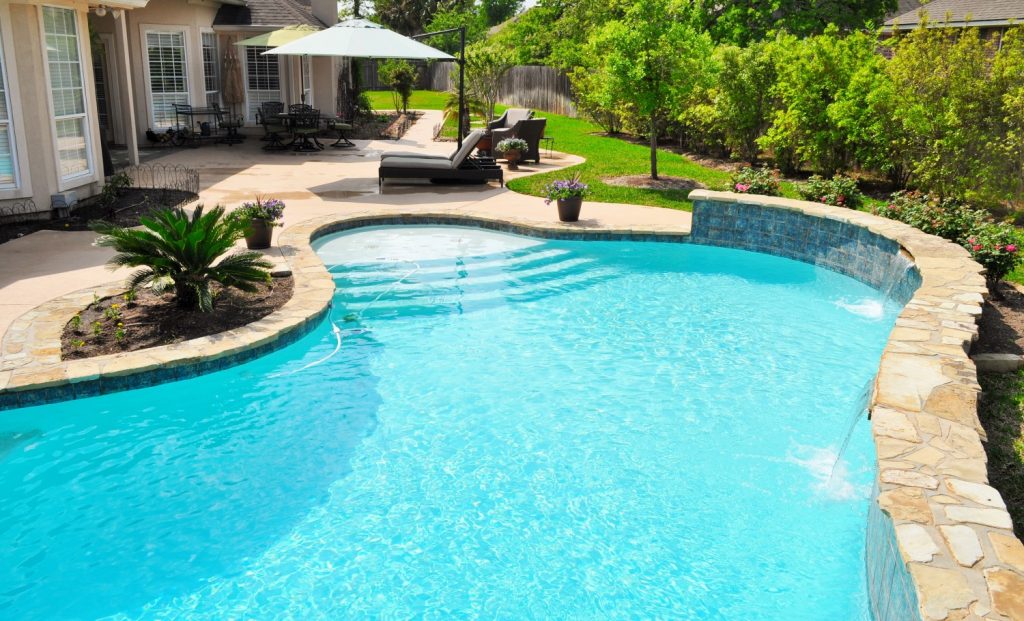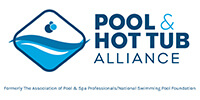What Affects My Swimming Pool Water Chemistry?

04/20/2018 | Categories: Pool Maintenance
Even with proper care and maintenance, a swimming pool can still get out of balance and need a little adjusting. Your water chemistry is constantly changing due to environmental factors, usage, and even the toys you put in the pool. Learn five factors that play a major role in your swimming pool water chemistry, and how you can control common issues in this area.
Swimming Pool Water Chemistry: pH Balance
pH is the major factor you should keep balanced when maintaining your swimming pool water chemistry. pH refers to the level of acidity in your water, and comes from the use of chemicals to keep it balanced and free from contaminants and algae growth. You want your pH to remain between 7.4 to 7.6 at all times to avoid burning eyes and to allow for free chlorine use.
Swimming Pool Alkalinity
Closely connected to pH, the alkalinity is the amount of base, or hydrogen ions, in your water. It also refers to the ability of your water to contain and reduce the loss of hydrogen. Keeping your alkalinity balanced helps to keep your pH levels optimal when additional acids or bases are introduced to the water. You want your pool’s alkalinity to be between 80 to 150 parts per million (PPM).
Pool Water Calcium Hardness Levels
Your pool has dissolved calcium salts in its water. These can increase or decrease from the oils and salts on people’s skin, from debris that falls into your pool, and from the chemical reactions that form from maintaining your water balance. You want to keep these levels around 250 ppm. If the calcium level is too low, it can create pitting in the plaster, while high amounts of calcium make the water cloudy and can result in scaling.
TDS (Total Dissolved Solids) in Your Swimming Pool
When a pool has been in use for a long time, things like suntan lotion, chlorides, dirt, debris, algaecides, and other contaminants can be introduced into the water from leaves, tree bark, dirt, skin chemistry, and other factors. TDS can’t be avoided, but it should be kept under 450 ppm.
Pool Chlorine Levels
Chlorine is, for many people, a vital part of keeping the chemistry in their water properly balanced. Too much chlorine, and you’ll end up with burning in the eyes and a strong odor. Too little, and the pool’s alkalinity and pH will be out of control, leading to things like cloudy water and algae growth. Ideal chlorine levels should be at 0.2ppm or less, and free chlorine should be in the range of 1 to 3 ppm.
If you are looking for the best professionals to maintain your pool, turn to Sunshine Fun for fast, friendly, and reliable service. We build pools so we know pools. With regularly scheduled service, you can rest easy and focus on simply enjoying your pool.
Sunshine Fun Pools is able to remodel your existing pool, build you a brand new one, and provide the very best in College Station area pool maintenance. With springtime upon us, now is the time to get started! Read about our pool services and give us a call for answers to all your questions today.
ABOUT THE COMPANY
A properly designed swimming pool is a combination of artistry and skilled construction principles. Sunshine Fun Pools has been applying these skills for more than fourteen years and has built over one-thousand pools in the Brazos Valley and surrounding area. As evidence of this success, Sunshine Fun Pools has been recognized by Pool and Spa News as a Top 50 Builder. Our philosophy is to build the highest quality, lowest maintenance, most energy efficient swimming pool available. Our quality control goal is zero call backs. We accomplish this by including standard features on our pools that other companies do not. Our strategic partnerships with companies like Hayward Pool Equipment and A&A Manufacturing allow our pools to be priced as competitively as possible while allowing our clients the freedom from time-consuming maintenance.
Call the experts at Sunshine Fun Pools today to schedule your personal consultation.















